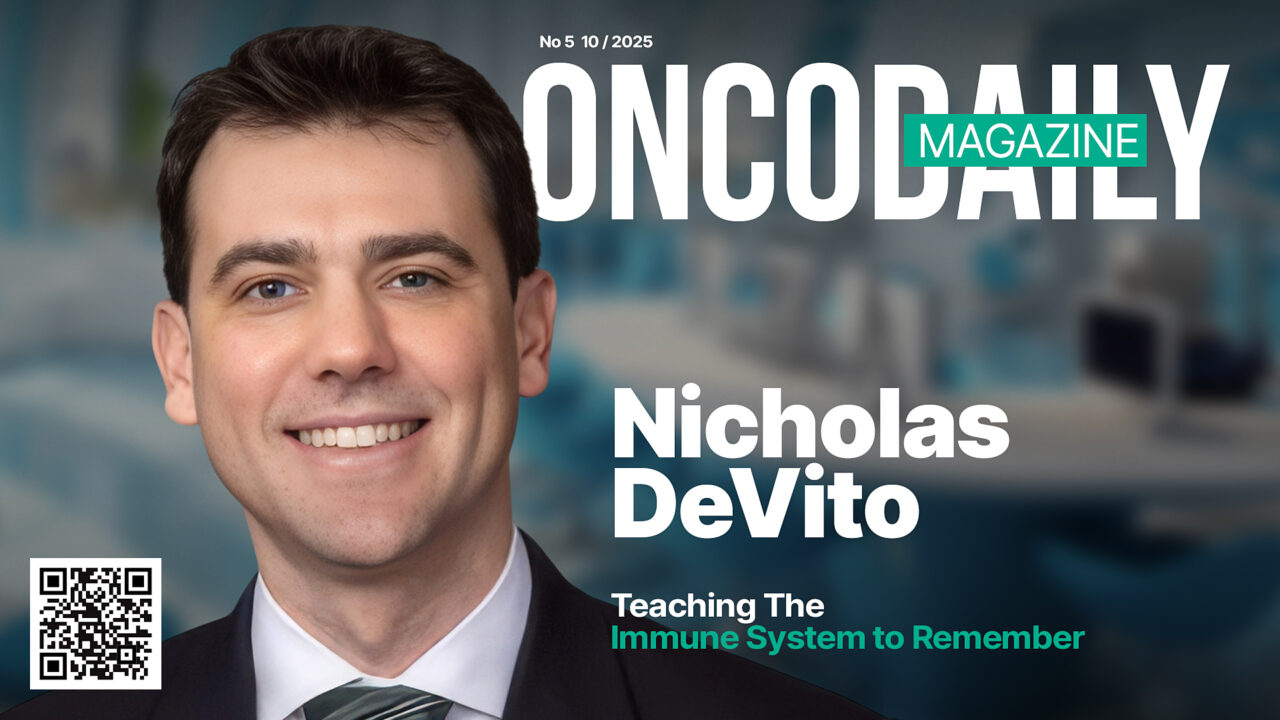He answers on the second ring. I apologize for catching him “early,” and he laughs – “It’s 2 p.m. here.” No lights, no cameras – just a quiet line before the afternoon clinic and a physician-scientist who talks about tumors, immunology, the way some people talk about languages: syntax, context, and how meaning shifts with sequence.
“I didn’t grow up in medicine,” he begins. “My mom was a teacher running an HIV-prevention program in Florida. Volunteering with her, I asked,
“Why don’t we have an HIV vaccine?”
That curiosity led him to immunology at Moffitt Cancer Center, where he worked in cancer vaccine labs.
“That was the beginning of my journey,” he says. “But then one day, I shadowed a myeloma clinician, Dr. Melissa Alsina. She made me stay with her from the first patient to the last. I realized I needed both: the logic of the lab and the reality of the clinic.”
By the time DeVito finished medical school in 2012, ipilimumab was making waves in melanoma. He was hooked.
“Only a small minority responded, but the responses were durable,” he recalls. “That rewired my thinking.
Why accept short wins with toxicity if the immune system can be taught to remember?”
The thesis in one line
“Give the durable therapy first. The order is not a detail – it’s the plot.”
DeVito treats gastrointestinal cancers at Duke and designs trials with a simple, yet patient-centric guiding question: If immunotherapy offers durable responses, why are we saving it for last?
“Late-line immunotherapy is a graveyard of diminishing returns,” he explains.
“Chemotherapy and targeted agents don’t just shrink tumors – they reshape the immune context. Sometimes they even make checkpoint blockade less effective down the line.”
So, what’s the solution?
“Flip the order. Start with what can last,” he says. “Give patients the best possible therapy from the beginning. This is not just about shrinking tumors – it’s about making sure the immune system can remember the fight.”
DeVito frequently talks about immunoediting with his fellows – a framework that explains cancer’s immune evolution.
“Think of it in three phases: elimination, equilibrium, and escape,” he says. “The immune system clears tumor cells, holds them in check, and, eventually, the tumor breaks free.
In clinical practice, these stages map directly to response, stable disease, and progression. If you view cancer through this lens, you stop thinking only about killing cells and start focusing on retraining the immune system.”
Bot/Bal, on purpose
His current first-line study in metastatic colorectal cancer – BB-OPCO – centers on a dual-checkpoint backbone with next-generation anti-CTLA4 Botensilimab and anti-PD1 Balstilimab, which his team calls Bot/Bal. The design is intentionally narrow: enroll patients before metastatic chemotherapy and without liver, bone, or brain metastases – those enriched, in late-line data, for response to the combo.
“The goal is both humane and scientific,” he tells me. “Humane, because some patients may delay—or avoid – chemo. Scientific, because a clean first-line setting lets you see real primary and adaptive resistance to immunotherapy without the noise of multiple prior regimens.”
Everyone gets a baseline biopsy; those who progress are offered another.
“Paired tissue is the window,” he says. “You can’t learn how tumors adapt if you never look twice.”
For DeVito, trials like Bot/Bal are not just about showing activity; they are about educating the field.
“If you only look at late-line patients, you’re tying your shoes together in the dark. You’ll never find biomarkers that truly guide care.”
We drift into trial craft. DeVito worries about the “all-comers, late-line” habit where phase I/II signals evaporate in phase III.
“Heterogeneous populations are biomarker killers. If everyone’s had three to six prior lines, across different sites of disease and genomic landscapes, you’re fumbling in the dark.”
BB-OPCO is his counter-design: select the biology, fix the line, biopsy twice, pre-specify translational questions. Learn who resists, how, and when – then iterate with sequence, not just add-ons.
Immunology as the compass
DeVito frames cancer as an immune failure: “It’s a neo-organ, growing and disguising itself as ‘self.’” To fix that failure, we must choreograph the immune system, not just unleash T cells.
“It’s not enough to bring T cells in… You have to choreograph the whole immune dance – dendritic cells, macrophages, even building tertiary lymphoid structures where none exist. Durable control is an ecosystem, not a solo.”
When I ask the big, unfair question – can we treat everyone with immunotherapy? – he answers by teaching.
“Ten years ago, the dogma was that MSS colorectal cancer doesn’t respond to immunotherapy. It was considered off-limits. Now, with rational combinations like Bot/Bal, we’re finally seeing responses – some durable. That doesn’t mean everyone, but it means the door isn’t locked. The challenge is to learn who can walk through, and why.”
And then, almost like a teacher closing a chalkboard:
“Sequence matters. Biology remembers. Challenge the dogma – or it will define the outcome.”
What’s next and why it matters now
Near-term, he wagers on combination immunotherapy in late-line MSS colorectal cancer, alongside a rise of bispecifics and ADCs (CLDN18.2 today; CDH17 and others tomorrow). He lights up at small-molecule inhibitors that create immunogenic epitopes – “time the hit, expose an epitope, ride a wave of bystander killing.”
But he circles back to discipline:
“Precision immunotherapy doesn’t mean treat everyone. It means choose the right someone, at the right time, with the right partners – and prove it in tissue.”
Where does he see himself in ten years?
“In the loop. Bench to bedside, bedside back to bench. That’s the engine. I’ll stay in the lab because mechanisms matter. And I’ll stay in clinic because patients keep you honest.”
Before he heads to clinic, I ask what he tells trainees. He smiles into the phone.
“Read widely. Ask the naive questions. Be creative but aim your curiosity at what matters for patients. And remember – sometimes the bravest move is to change the order.”
The line clicks quiet. Outside his office, another clinic begins. And somewhere between those rooms, Nicholas DeVito keeps writing the same note in the margin of oncology’s playbook: start with what can last – and never stop challenging the rules.
by Amalya Sargsyan, MD, VP of Research and Intelligence, OncoDaily
Read also:
Botensilimab: A Novel Anti-CTLA- 4 Therapy Effectively Treats Refractory Colorectal Cancers
Botensilimab: A Revolutionary Fc-Enhanced CTLA-4 Inhibitor Transforming Cancer Immunotherapy



